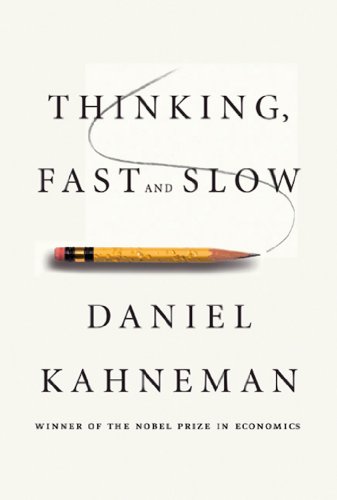Here is a summary of the top lessons from the book Thinking, Fast and Slow by Daniel Kahneman.
System 1 vs System 2
Our behavior is determined by 2 systems in our mind – one conscious and the other automatic. We think fast using heuristics for things we are familiar with instantly connecting the dots. We think slow when making important complex decisions we are unfamiliar with.
System 1 is automatic and quick, with almost no conscious effort and little sense of voluntary control, it is instant in conclusions and action. System 2 allocates attention to conscious thinking when needed to solve complex problems or make important decisions.
Fast thinking at times can lead to errors in judgement when assumptions are incorrect. Other times slow thinking is a waste of time when we quickly know the right decision to make, but complicate it with overthinking.
Thinking Fast and Slow
Here are some of the best quotes from the book:
“Nothing in life is as important as you think it is, while you are thinking about it” ― Daniel Kahneman
“Our comforting conviction that the world makes sense rests on a secure foundation: our almost unlimited ability to ignore our ignorance.” ― Daniel Kahneman
“If you care about being thought credible and intelligent, do not use complex language where simpler language will do.” ― Daniel Kahneman
“Intelligence is not only the ability to reason; it is also the ability to find relevant material in memory and to deploy attention when needed.” ― Daniel Kahneman
“The idea that the future is unpredictable is undermined every day by the ease with which the past is explained.” ― Daniel Kahneman
“This is the essence of intuitive heuristics: when faced with a difficult question, we often answer an easier one instead, usually without noticing the substitution.” ― Daniel Kahneman
“A general “law of least effort” applies to cognitive as well as physical exertion. The law asserts that if there are several ways of achieving the
same goal, people will eventually gravitate to the least demanding course of action. In the economy of action, effort is a cost, and the acquisition of skill is driven by the balance of benefits and costs. Laziness is built deep into our nature.” ― Daniel Kahneman
“The confidence that individuals have in their beliefs depends mostly on the quality of the story they can tell about what they see, even if they see little.” ― Daniel Kahneman
“We are prone to overestimate how much we understand about the world and to underestimate the role of chance in events.” ― Daniel Kahneman
“We can be blind to the obvious, and we are also blind to our blindness.” ― Daniel Kahneman
“Acquisition of skills requires a regular environment, an adequate opportunity to practice, and rapid and unequivocal feedback about the correctness of thoughts and actions.” ― Daniel Kahneman
“We focus on our goal, anchor on our plan, and neglect relevant base rates, exposing ourselves to the planning fallacy. We focus on what we want to do and can do, neglecting the plans and skills of others. Both in explaining the past and in predicting the future, we focus on the causal role of skill and neglect the role of luck. We are therefore prone to an illusion of control. We focus on what we know and neglect what we do not know, which makes us overly confident in our beliefs.” ― Daniel Kahneman
“The premise of this book is that it is easier to recognize other people’s mistakes than our own.” ― Daniel Kahneman
